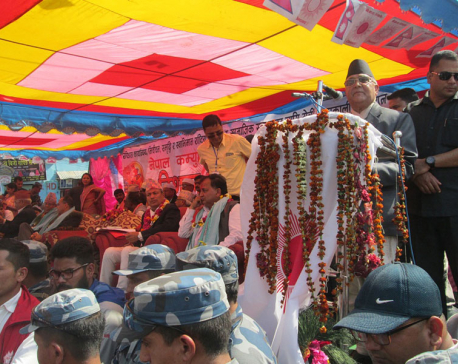
OR
Size of the cabinet
By far the most important responsibility that has fallen on the shoulders of new Prime Minister Sher Bahadur Deuba is to create the right conditions for completion of all three sets of elections by the constitutionally-mandated January 21, 2018 deadline. And even though there are plenty of skeptics, Deuba might just have it in him to prove them wrong on this count. But in a democracy, the process is as important as the end goal. As PM Deuba tries to cobble together a coalition capable of amending the constitution to the satisfaction of protesting Madhesi and Janajati forces, we are afraid that he could again resort to the time-worn tactics of wantonly distributing ministries and then lavishing his many ministers with all kinds of unearned perks. This he could do, first, to strengthen his government against an imminent demise, and second, so that he has enough votes for desired amendments. In fact, Debua, during his three previous stints as prime minister, was notorious for all kinds of shenanigans to keep the ruling coalition intact. He broke up existing ministries to accommodate more ministers; during his first term, he had become notorious for distributing the expensive Pajero cars to his ministers; he even engineered a divide in Nepali Congress in his mad quest for power.
On Wednesday, he inducted seven members into his new cabinet, along with three deputy prime ministers. We are afraid that this number could rapidly multiply as PM Deuba tries to ‘satisfy’ all the parties that elected him prime minister on Tuesday. A dangerous culture has taken hold. Our new political system is such that it will be difficult for any one party to form a majority government for four years. In this situation, the coalition prime minister will always be under pressure to divide ministries among parties big and small and keep his coalition partners in good humor through various perks from state coffers. Yet the same constitution that precludes a single-party majority also caps the number of ministers at 25. The two governments that were formed after the promulgation of the new constitution, and which preceded the Deuba government, easily exceeded this cap. Both KP Oli and Pushpa Kamal Dahal tried to justify their jumbo cabinets with the excuse that with as many as 30 parties in parliament, the cap of 25 was rather impractical.
So Deuba, in all likelihood, will not have many scruples about forming another jumbo cabinet. But he should resist the urge. The one and only reason the new constitution should be amended is to make it more inclusive, and thereby to increase its legitimacy.
But this should be a matter of principle; making it a condition to extract benefits from the state will, in fact, in a way delegitimize any future amendments. Such purely transactional politics, while besmirching the big ruling parties, will also discredit the smaller parties that, even with just one or two seats, want important ministries. The image of the whole political class could decline as a result. Deuba has a great opportunity to mend his at best patchy past image as government head. At the fag end of his political career, he should be more concerned about his legacy than somehow—anyhow—holding on to the prime minister’s chair.
You May Like This

Bankers, business leaders divide over new consortium loans rule
KATHMANDU, June 21: Business leaders have urged the central bank to put a rule that requires bank and financial institutions (BFIs)... Read More...

Constitution amendment a conspiracy to divide Hill and Tarai, claims UML Chair Oli
DHANGADI, March 16: CPN-UML Chair KP Sharma Oli has claimed that the issue of endorsement of the constitution amendment bill... Read More...

Digital divide
Our obsession with smart phones, tablets, internet, emails, and other social media apps has distanced us from our children further... Read More...




Just In
- Health ministry to conduct ‘search and vaccinate’ campaign on May 13
- Indian customs releases trucks carrying Nepali tea, halted across Kakarbhitta
- Silent period for by-election to begin from midnight
- SC issues short-term interim order to govt and TU not to take immediate action against TU legal advisor Khanal
- National consultation workshop advocates to scale up nutrition smart community in Nepal
- Patan High Court issues short-term interim order to halt selection process of NTB’s CEO
- NEPSE inches up 0.15 points; daily turnover increases to Rs 2.53 billion
- Bagmati Govt mandates tri-lingual signboards in offices














Leave A Comment